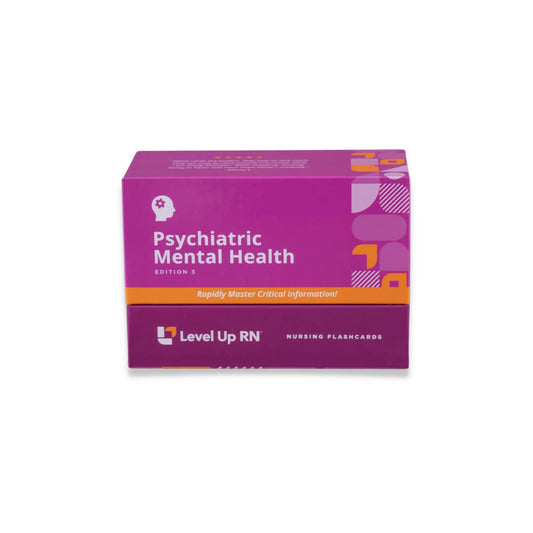Welcome to the Psychiatric Mental Health Nursing video and article series. This series follows along with our Psychiatric Mental Health Nursing Flashcards which are intended to help RN and PN nursing students study for nursing school exams, including the ATI, HESI, and NCLEX.
Psychiatric Mental Health - Nursing Flashcards
Why is psychiatric mental health important in nursing?
Psychiatric Mental Health Nursing concepts are essential for ALL nursing students and nurses.
Understanding Psychiatric Mental Health concepts will not only help you be better prepared for your exams, it will also help you be more successful in your clinical rotations and in your nursing career.
You will regularly encounter patients with mental health concerns and disorders in every type of nursing environment. It is essential that nurses be able to effectively assess for mental health concerns, advocate for their patients, ensure patient safety (AND their own personal safety), and provide therapeutic communication.
Mental Health admissions & commitments
Patients can be admitted (by themselves) to a psychiatric facility or unit, or they can be committed (by someone else).
Admit and commit both use the same Latin root mittere which means to put or send. Commit comes from committere which means "to place in the keeping of" and admit comes from admittere which means "to allow entrance or approach."
Voluntary Admission
Voluntary psychiatric admission can happen when a patient requests admission to a psychiatric facility or unit, and the patient may sign out at any time.
Please note that admission may be changed to involuntary if the patient meets certain criteria established by state law.
Involuntary Commitment
Involuntary psychiatric commitment is when a patient is admitted to a psychiatric facility or unit without their consent because they pose a risk to self or others, or is gravely disabled (unable to care for basic personal needs). Involuntary commitment requires a certain number of physician (usually 2, but it varies by state) to confirm justification for commitment.
Emergency Commitment
Emergency psychiatric commitment is when a patient is admitted to a psychiatric facility or unit because they are an imminent threat to self or others. This type of commitment requires a court hearing within 24-72 hours to determine if the patient may be discharged, or if involuntary commitment is required. Laws vary by state.
Both involuntary commitment and emergency commitment are without the patient's consent, but emergency commitment is considered more of a short-term solution in emergency cases.
Patient Rights
Patient Confidentiality
HIPAA law protects a patient's right to privacy. Patient information may not be disclosed to anyone that is not directly involved in the care of the patient without the patient's consent. One exception to this is that you as a nurse have a duty to warn.
Duty to warn
A nurse's duty to warn is if the nurse determines the patient poses a serious threat to another person, the nurse has to protect the third party. So information that would normally be protected by HIPAA is not protected in the case of warning against possible harm.
For example, if your patient says, "When I get out of here I'm going to kill somebody/hurt someone," then you have a duty to warn that third party due to those safety concerns.
Right to Refuse Treatment
Patients have the right to refuse medications or other therapies even if they were involuntarily admitted, except in an emergency. This right is available to the patient even after they have signed an informed consent form. Check out our Fundamentals of Nursing article on Right to Refuse for more information on the right to refuse as it pertains to all of nursing, not just the mental health setting.
For example, if you have a patient with bipolar disorder who is refusing their bipolar medications, as the nurse, you would talk to this patient and explain the benefits and risks of not taking that medication, but at the end of the day, it is that patient's choice and you will have to respect it. This helps you to uphold the nursing ethical standard of autonomy.
In the mental health setting, the emergency exception to the right to refuse would usually be a situation where a patient was getting violent and posing a risk of harm to themselves or other people, in which case medications may need to be provided regardless if the patient is consenting or not.
Right to Least Restrictive Environment
In the mental health setting, a patient has a right to the least restrictive environment. This means that restraints or seclusion should only be used as a last resort and for the shortest duration of time possible.
In the mental health setting, what this means is the care team would try other alternatives before resorting to restraints or seclusion.
Check out our video on patient restraints in the mental health setting for more information!



1 comment
i always learn from you thanks just keep it u